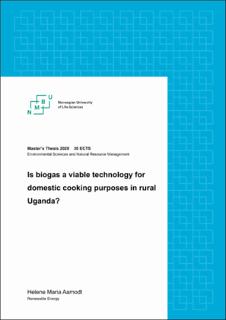| dc.description.abstract | Sustainable development and renewable energy security are global concerns today. In developing countries, these challenges are coupled with increased energy demand. Firewood and charcoal are the most used cooking fuels in Uganda, as only a small percentage has access and economy to use electricity. Wood fuel has many adverse side effects for people, nations, and the environment, which promotes a need for sustainable alternatives. Biogas plants transform organic waste with low value into gas and fertilizer for plants. A biogas plant could benefit many parties, but several critical factors can inhibit the viability of the system.
This thesis aims to explore if biogas is a viable technology for domestic cooking purposes in rural Uganda by asking; What are the costs and benefits of domestic biogas plants for the user in rural Uganda?, II: What are the criteria for a successful implementation of domestic biogas plants? and III: What are the critical factors for a successful implementation for domestic use? The research questions were answered by the use of two methods; 1) Literature review of studies of technology implementation and domestic biogas plants in developing countries and 2) Qualitative interviews with participants and fieldwork in rural Uganda. The results of the economic assessment on the Nyenga Foundation’s biogas plant showed that biogas is the cheapest cooking alternative compared to wood fuel, LPG, and electricity. However, the investment cost of a domestic biogas plant is high, which can be a significant challenge for many stakeholders.
A successful biogas plant has a lasting and expanding operation, and a user owning the knowledge and handling challenges. Various factors are critical to the implementation of domestic biogas plants; economic, technical, environmental, cultural, social, and institutional, which must be addressed to see successful implementation. The participants showed that the most critical barriers to a domestic biogas plant were owning the knowledge of the plant and using it to plan an effective biogas system from cow to field. The results implicate a necessity of spreading knowledge and the benefits of biogas plants. The information shared should include suggestions on making a sustainable system where all the biogas plants’ benefits are utilized. | en_US |

